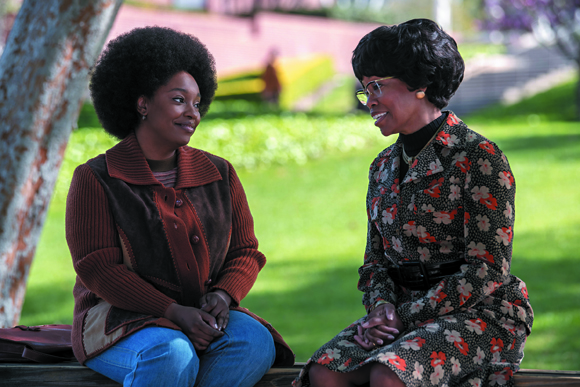ELLY GRIMM
• Leader & Times
Shirley Chisholm has the unique distinction of being the first black woman to be elected to the United States Congress and later becoming the first black candidate for a major-party nomination for President of the United States as well as the first woman to run for the Democratic Party's presidential nomination back in 1972.
Chisholm’s story has been one that has resonated with me since briefly learning about it while in school and recently, the powers that be at Netflix decided to share her story with the new film “Shirley,” which focuses on her ultimately unsuccessful 1972 presidential run.
One of the surprising aspects about this movie is how many of the issues faced and discussed could still be applicable to 2024 politics. One example comes near the beginning of the movie when she expresses her frustration about not being appointed to a committee that would actually benefit her constituents because of the powers that be, comprised of (not) surprisingly, older white men, and my immediate thought after that scene was “Good to know THAT hasn’t changed much” complete with eye roll regarding the dominant demographic in politics. Another scene that particularly stood out to me was when she makes a speech at Mills College in Oakland, Calif. and talks about the problems with race and gender politics as well as the need to put all of that aside to help make the U.S. a true haven for people of ALL kinds. After that particular scene, it again amazed me how a message all the way back from the 1970s still needs to even be thought about in 2024. A subsequent scene featuring a conversation between Chisholm and future Congresswoman Barbara Lee about getting involved in the political process and the importance of voting is also very well done, and it reminded me of all the times my late dad would talk about how when he was growing up, my grandpa would tell him (as well as my aunt and uncles) if he didn’t vote, he had nothing to complain about. There are a few other scenes throughout the movie that gave me similar thoughts – I’m not sure if that was necessarily the filmmakers’ intent, but that’s how I ended up coming away.
Another good move I thought the movie made was making the characters actually human and flawed. Too many biopics sanitize their subjects too much, and I appreciated the cast being able to give these characters some crags and a bit more of an edge than might be expected. A prime example of this is Regina King in the titular role, because King makes Chisholm stubborn and somewhat callous, which I think is great because even just imagining everything she had to go through in that time being a Black woman in politics would be out of my depth – and I can all but guarantee the movie barely scratched the surface in that regard. The relationship between Shirley and her husband, Conrad, is also portrayed well, and I liked how they included some tension and frustration between the two as far as Shirley not wanting to back down from her campaign and Conrad wanting to be supportive but also supported by his wife in everything he does. Overall, I appreciated how all the various characters were allowed to actually be human and flawed.
Going along with that, I also have to give the casting crew because they picked everyone pretty perfectly. Regina King all but disappears and seems to become Shirley Chisholm and portrays all the stress and frustration and every other emotion one must go through during a political campaign as well as some vulnerability, particularly near the end of the movie when she decides to ultimately end her campaign. With Chisholm being such a prominent figure in multiple facets of history, I can’t imagine what King was feeling recreating the various speeches and stepping into such big shoes. Another standout for me was Lucas Hedges as Robert Gottlieb, one of Shirley’s advisory team – he’s more in the background throughout the movie, but he’s a bit of a scene-stealer when he’s onscreen, and I really liked his character. The leading cast is a little smaller compared to other similar films, but everyone does a great job and again, I have to tip my hat to the casting crew.
While I overall enjoyed the movie, my overall impression after I finished was how it could have been even better, because I feel the movie barely scratched the surface about Chisholm and everything she must have felt and gone through while she made history with her campaign. Unfortunately, “Shirley” falls into some of the typical biopic tropes and is hampered by a runtime that doesn’t feel nearly long enough to fully capture this part of Chisholm’s story. Overall, while the movie is a good depiction of a politician who opened the door for people of all backgrounds to claim a seat at the table, I felt it could have used an extra shot or two of that “oomph” factor to really make it great, especially given the caliber of talent involved.
Overall, I enjoyed “Shirley” and would give it a solid “B” grade. I thought it interesting how there were multiple of the movie’s themes that could also apply to 2024 politics – I can’t say if that was fully the filmmakers’ goal to do that, but I definitely noticed it. I also thought the cast did a great job, particularly Regina King in the lead role, though I felt the movie’s overall story could have used a bit of strengthening to make it truly great. “Shirley” is available on Netflix and is rated PG-13 for strong language, brief violence, some smoking, and racial slurs.









